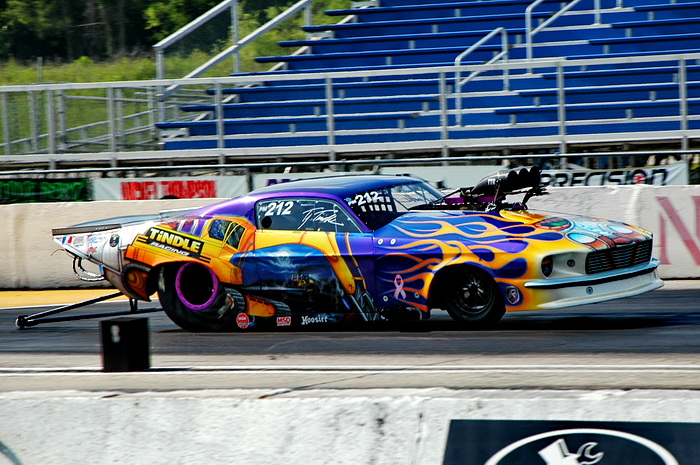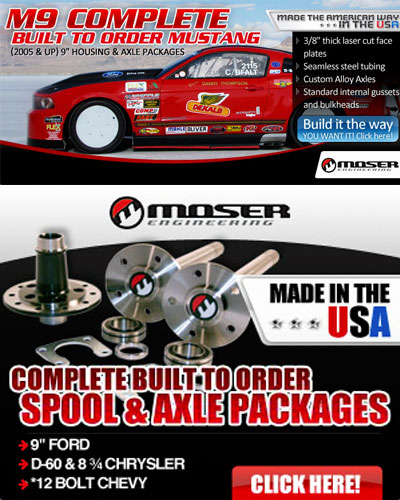IAN TOCHER: SAFE TO SAY X-DRL EXPERIMENT IS OVER
 With three events left in its eight-race inaugural season the X-treme Drag Racing League ran into “X-treme” trouble. Late purse payments to racers plagued the upstart eighth-mile organization almost from the start and promises from series president Jeff Mitchell to make good are now looking about as empty as—well, as empty as the grandstands on race day at an X-DRL event.
With three events left in its eight-race inaugural season the X-treme Drag Racing League ran into “X-treme” trouble. Late purse payments to racers plagued the upstart eighth-mile organization almost from the start and promises from series president Jeff Mitchell to make good are now looking about as empty as—well, as empty as the grandstands on race day at an X-DRL event.
Whether this mess—and make no mistake about it, the X-DRL experiment can now officially be referred to as a mess—is self-inflicted or the X-DRL is at the mercy of its own non-paying “sponsors,” the credibility of the series is destroyed. Time after time racers, fans and media alike this year heard reassurances, statements of solvency, pledges of support and offers of excuse, but with the outright cancellation late in August of events at Indianapolis and Montgomery, Alabama, and the season-ending X-DRL World Finals at Charlotte in October left as little more than an underfunded dream, it’s time to get the forks out; the X-DRL is done.
After a decent debut at Tulsa in April, through no fault of its own the X-DRL suffered through a rainout at Bristol later that month at an event that attracted only about 80 race teams and perhaps as many spectators. During one of several rain showers I sat down with Mitchell and asked how much of a setback—financially—a race like that would be to the fledgling X-DRL and he assured me it was none. “The money is not at the track,” he said, explaining he wasn’t relying on racer entry fees or spectator admissions to keep the series afloat. “We have a three-year plan and there’s enough (money) lined up right now to see it through those three years.”
 With three events left in its eight-race inaugural season the X-treme Drag Racing League ran into “X-treme” trouble. Late purse payments to racers plagued the upstart eighth-mile organization almost from the start and promises from series president Jeff Mitchell to make good are now looking about as empty as—well, as empty as the grandstands on race day at an X-DRL event.
With three events left in its eight-race inaugural season the X-treme Drag Racing League ran into “X-treme” trouble. Late purse payments to racers plagued the upstart eighth-mile organization almost from the start and promises from series president Jeff Mitchell to make good are now looking about as empty as—well, as empty as the grandstands on race day at an X-DRL event.
Whether this mess—and make no mistake about it, the X-DRL experiment can now officially be referred to as a mess—is self-inflicted or the X-DRL is at the mercy of its own non-paying “sponsors,” the credibility of the series is destroyed. Time after time racers, fans and media alike this year heard reassurances, statements of solvency, pledges of support and offers of excuse, but with the outright cancellation late in August of events at Indianapolis and Montgomery, Alabama, and the season-ending X-DRL World Finals at Charlotte in October left as little more than an underfunded dream, it’s time to get the forks out; the X-DRL is done.
After a decent debut at Tulsa in April, through no fault of its own the X-DRL suffered through a rainout at Bristol later that month at an event that attracted only about 80 race teams and perhaps as many spectators. During one of several rain showers I sat down with Mitchell and asked how much of a setback—financially—a race like that would be to the fledgling X-DRL and he assured me it was none. “The money is not at the track,” he said, explaining he wasn’t relying on racer entry fees or spectator admissions to keep the series afloat. “We have a three-year plan and there’s enough (money) lined up right now to see it through those three years.”
Mitchell had two financial partners at the time, Larry Pearce and David Hubbard, but both were gone after the next race at Belle Rose, Louisiana. It seems they bolted after watching the spectator count again barely exceed the car count and witnessing consistent four-hour qualifying rounds just to send a total of 99 entries down the track—with no major crashes or oil downs. That’s 50 pairs each 240 minutes for those counting, or roughly five minutes (average) between passes. That is not a good drag race by anyone’s standards.
To be honest, Mitchell looked stunned by the end of the event, like it was finally settling in just how much this series was going to cost him. And the late payments began.
By the time the series reached St. Louis in mid-June, three weeks after the Belle Rose event, racers had received no prize money and online chatter began to build about the late-payment situation, as well as the disappointing turnouts both in the pits and the stands at X-DRL events.
During an informal “State-of-the-X-DRL” address the night before qualifying began, Mitchell pledged before about a hundred race team members that everyone would be paid by check for the Louisiana race “within a week” and the X-DRL would establish a post-race pay schedule for the St. Louis race and all events to come. “Whether it's 10 days or 21 days or five days, I really don't know what we're going to commit to do. But we're going to commit to something we can live with,” Mitchell told me in an interview for CompetitionPlus.com at the time. “And if we just can't stick to it we'll be telling you at the race track. When you come in and give me your $500 to race, I'll tell you up front then,” he added.
Regarding poor spectator turnout, Mitchell relied on a strange belief pervasive among several X-DRL employees that a supposedly strong online presence would make up for the weak gate at the track, telling the assembled racers not to focus on the fans disguised as barren aluminum, but to remember “there's 20- to 40-thousand people watching you at home. So don't get all down in your cups if there's not a bunch of people in the stands.” And unfortunately, but true to form, almost no one showed up in person to watch the X-DRL at St. Louis. To be honest, I was embarrassed for them; that’s how bad it was.
And unfortunately, but also true to form, instead of being just one race behind in payouts leaving St. Louis, the X-DRL was two races in arrears as it headed to Budds Creek, Maryland, late in July. But again Mitchell issued a statement, saying this time the Budds Creek purse would be paid at the track and by Aug. 15, all monies owed would be cleared from the books.
Well, checks were handed out after the race—which had even poorer racer participation than any preceding it—but most were returned for non-sufficient funds in the account. Then Aug. 15th came and went with nothing resolved.
Quite naturally and with justification, I believe, racer frustration over their lack of payment and indignation at being treated so poorly quickly boiled over, with message boards, online forums and Facebook pages filled with posts critical of the X-DRL, all while Mitchell sycophants continued to insist everything was fine and urged the disgruntled to call the boss himself for the real story.
Well guess what? I tried. Over the course of a week I left five messages for Mitchell at a number I know he uses, but never received a call back. Now, I know Mitchell is obviously a busy man these days and he’s certainly not obligated to speak with me, but I also feel like I always treated him and the X-DRL with fairness and respect in my reporting, so I can’t understand why the courtesy of even a “no comment” call couldn’t have been extended.
Instead the silence was deafening at X-DRL headquarters deep in the heart of Texas. That is, until some anonymous staffer had the gall to take to Facebook Aug. 22, to post an unattributed “quote” about the online backlash:
“While we understand the power of open communications and acknowledge its importance in today's digital world, our industry does struggle to attract new corporate money, followers and fans when this power is used in such a negative way. It can cause certain companies to avoid the relationship for fear of being attacked for aligning themselves with the sport."
Pardon me? The X-DRL is blaming Internet commentators—many with a legitimate, personal interest in getting paid—for its troubles in attracting sufficient sponsorship to pay its bills? Can you imagine any other sporting body issuing such a statement? The NFL? Major League Baseball? NASCAR? How about the NHRA?
No, the struggle the X-DRL faces in attracting new corporate money stems from its own incompetence. The online and media criticism it faces would not exist if not for doing an overall poor job at promotions, operations and financials. Companies are not avoiding a relationship with the X-DRL “for fear of being attacked for aligning themselves with the sport.” There’s nothing wrong with the sport; there’s a lot wrong with the X-DRL!
Now, I have to make clear, I don’t think Jeff Mitchell is a crook, I don’t think he’s inherently dishonest and I don’t think he’s a bad person. I think he’s a decent businessman who was sold a flawed concept to start a new drag racing series from scratch and dove headlong into the challenge, woefully unprepared and overly optimistic. A year ago, he just wanted to start his own Extreme Pro Stock team and go racing, but instead got talked into heading up the X-treme failure the X-DRL has become. He’s the guy who just wanted a good steak, but instead ended up owning the restaurant—and nobody wants to eat there anymore.
The act of cutting and pasting articles from this publication to a message board is a clear copyright violation as is pulling photos to post on social media sites. All articles and photography published in CompetitionPlus.com are protected by United States of America and International copyright laws unless mentioned otherwise. The content on this website is intended for the private use of the reader and may not be published or reposted in any form without the prior written consent of CompetitionPlus.com.





































